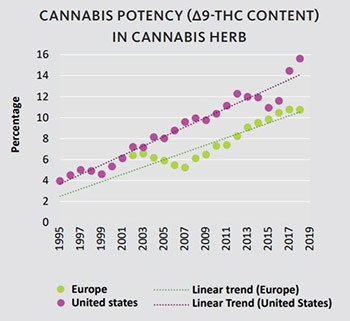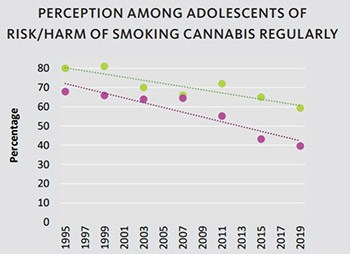Cannabis is more potent but fewer young people view it as harmful. Those two points of interests are underlined in a 2021 World Drug Report released June 24 by the United Nations Office on Drugs and Crime (UNODC), which suggested a worldwide ban on cannabis advertising.

From UNODC World Drug Report
The percentage of delta-9 tetrahydrocannabinol (THC), the main psychoactive component in cannabis, rose from about 4% to 16% in the U.S. between 1995-2019, and from about 6% to 11% in Europe between 2002–2019, according to UNODC findings outlined in the five-booklet report.
According to the report, delta-9 is responsible for the development of mental health disorders in long-term, heavy users of cannabis, yet the percentage of adolescents perceiving cannabis as harmful has decreased by as much as 40% during the same period—the latter finding is supported by surveys of schoolchildren and young adults in the U.S. and Europe, according to the UNODC.
“Lower perception of drug use risks has been linked to higher rates of drug use, and the findings of UNODC’s 2021 World Drug Report highlight the need to close the gap between perception and reality to educate young people and safeguard public health,” UNODC Executive Director Ghada Waly said in a statement.

From UNODC World Drug Report
The UNODC did not cite where it derived its conclusion regarding mental health disorders being linked to cannabis use in the section of the report it was mentioned. Cannabis Business Times reached out to UNODC for a comment, seeking clarity of a study or scientific entity supporting that claim, but has not yet received a response.
A team of researchers writing in the July 28, 2007, edition of the British peer-reviewed general medical journal The Lancet stated that consuming cannabis could boost one’s risk of a psychotic illness later in life by 40% or more.
As the National Organization for the Reform of Marijuana Laws (NORML) revealed the week after that edition was published, the authors of the study affirmed that the association “does not necessarily reflect a causal relation” between consuming cannabis and triggering psychotic behavior. In other words, there could be a spurious, or third-party, relationship responsible for the correlation.
Paul Armentano, who was a senior policy analyst for NORML in 2007, said there were several explanations for the observed correlation.
“Individuals suffering from mental illness such as schizophrenia tend to use all intoxicants— particularly alcohol and tobacco—at greater rates than the general population,” he said in 2007. “Not surprisingly, many of these individuals also use cannabis.”
Also in the 2021 World Drug Report’s findings and conclusions, UNODC stated that aggressive marketing of cannabis products with high THC content by private firms as well as promotion through social-media channels can worsen what the UN’s office calls a perception-versus-reality problem among young people.
As a result, the UNODC is calling for a comprehensive ban on cannabis advertising, promoting and sponsoring, which “would ensure that public health interests prevail over business interests,” as stated in the report. Such a ban would need to apply across all jurisdictions, and the measure could work in a way similar to the provisions of the World Health Organization (WHO) Framework Convention on Tobacco Control, according to the report.
That 2003 WHO treaty collected 168 signatures, including the U.S., although the U.S. is one of six signees that has yet to ratify it. In 2019, the largest cigarette and smokeless tobacco companies spent $8.2 billion on advertising and promotional expenses in the U.S., according to the Centers for Disease Control and Prevention. However, the U.S. does have certain restrictions and regulations in place for advertising and promoting tobacco, according to the Food and Drug Administration.
An advertising ban for the cannabis industry would work opposite of public health interests, Rosie Mattio said in a June 24 tweet, following the release of the UNODC report. Mattio is the founder and CEO of New York-based Mattio Communications, a public relations firm serving more than 50 cannabis clients.
“Advertising is one of the most effective ways regulated companies can educate consumers and patients,” Mattio said. “This will ultimately hamper the industry’s efforts to bring safe and accessible cannabis to adults around the world.”
According to the World Drug Report, more investment is needed for research into the harm that the non-medical use of cannabis poses to health and to better define the range of health conditions for which cannabis products may be an effective treatment.
Global monitoring of the impact of laws that allow for the medical and non-medical use of cannabis is key, the UNODC report stated.
“This will need to go beyond the trends in cannabis use in a single country to assessing the frequency and patterns of cannabis consumption, health and socioeconomic consequences and market developments in both the licit and the illicit sectors around the world,” it said. “One important aspect to evaluate is the impact of cannabis legalization on the perception of risks associated with cannabis use, particularly among young people, beyond the countries where this legalization is taking place; it would also be critical to assess the risk perceived by young people in low-income countries.”
Underlying findings outlined in UNODC’s 2021 World Drug Report, as it relates to cannabis, include:
- Roughly 200 million people used cannabis in 2019, representing 4 percent of the global population. The figure is highest in North America (14.5 percent) and lowest in Asia (2 percent).
- The number of cannabis users has increased by nearly 18 percent over the past decade
- Between 2009–2019, quantities seized fell by 35 percent, largely because of dramatic declines in North America partly linked to legalization of non-medical cannabis in some jurisdictions.
- Excluding North American data, global seizures were 36 percent higher in 2019 than in 2009.
- Diverse cannabis products have become more potent yet the number of adolescents regarding the drug as harmful is declining rapidly, a trend that risks increasing the negative impact of cannabis on younger generations.
- An increase in cannabis use has been observed in many countries during the pandemic.
The full report is available here: https://www.unodc.org/unodc/en/data-and-analysis/wdr2021.html

